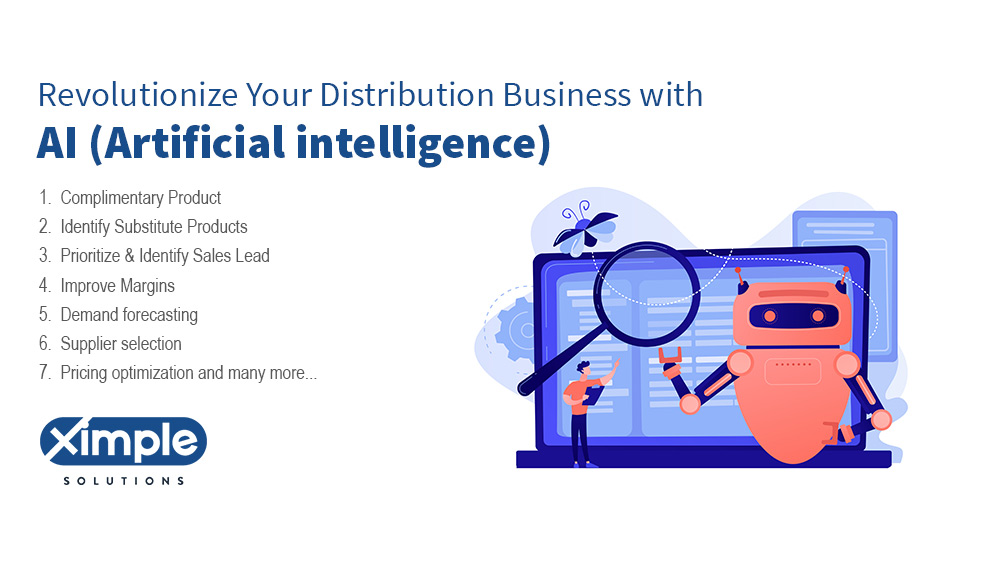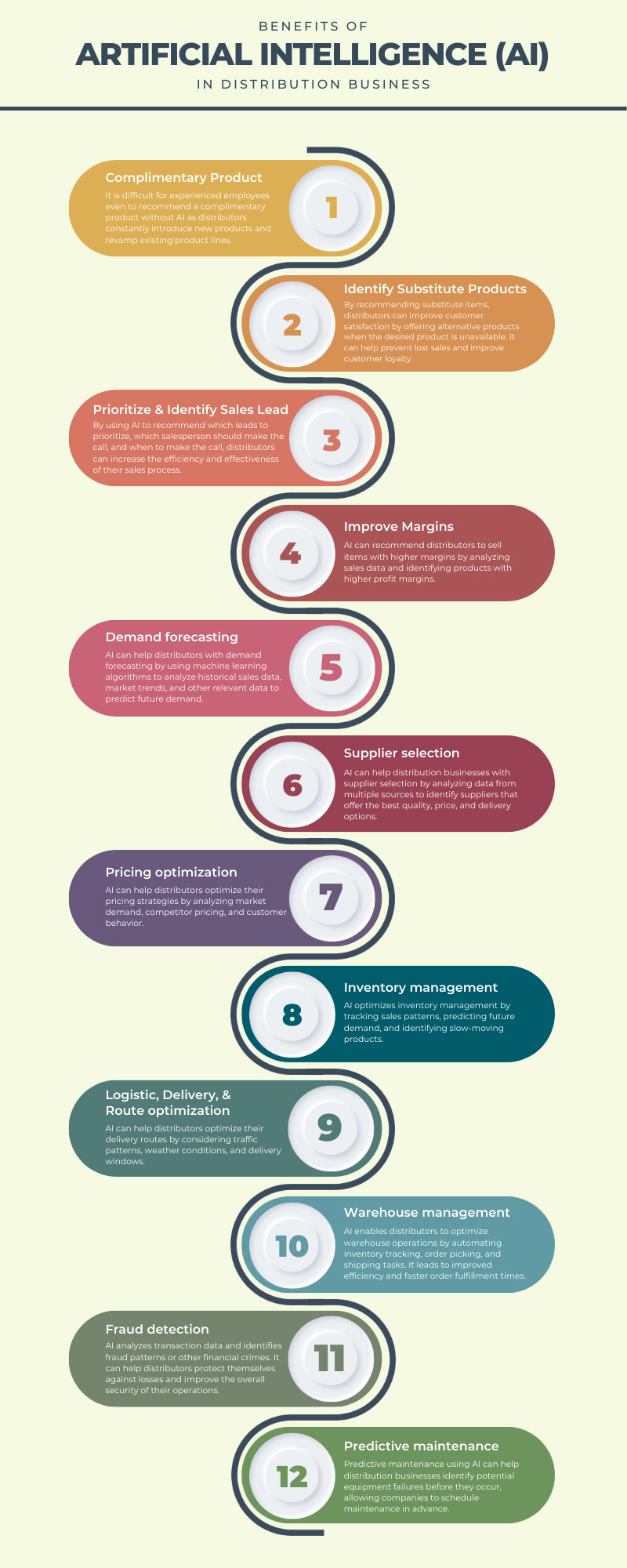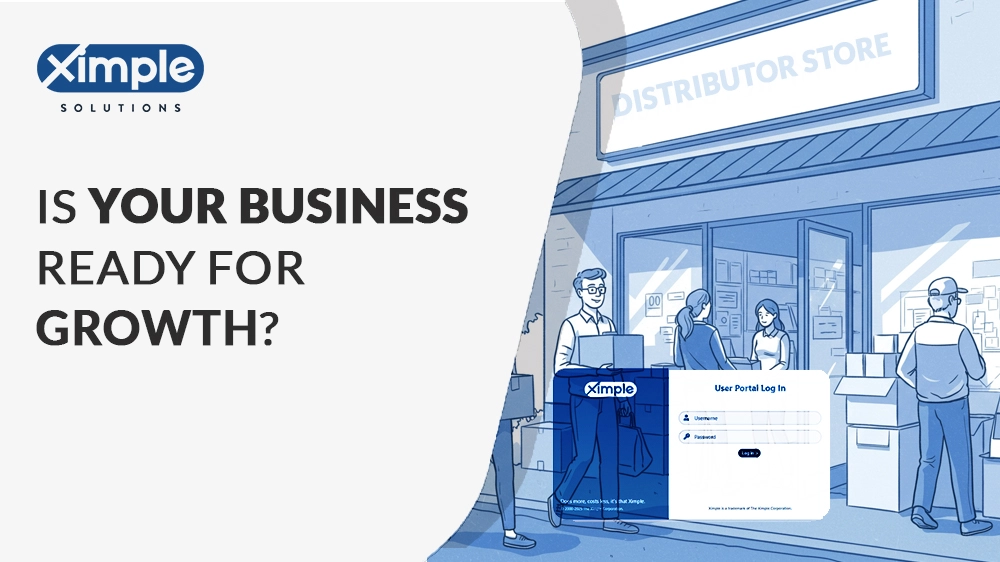Revolutionize Your Distribution Business with AI: Real-Life Success Stories and Benefits

This article highlights several real-life examples of how distribution businesses leverage cutting-edge technologies to gain a competitive edge and minimize risk. With real-world examples from industry leaders, this article is a must-read for anyone looking to stay ahead of the curve in the fast-evolving distribution world. So, to gain a competitive edge and future-proof your business, check out this informative and thought-provoking piece.
In today’s fast-paced and competitive business environment, distributors cannot afford to fall behind their competitors. Artificial intelligence has become a game-changing technology for the distribution industry, enabling businesses to streamline their operations, increase efficiency, and boost profitability. By leveraging AI technologies, distributors can make more informed decisions, identify growth opportunities, and gain a competitive edge in the marketplace.

With machine learning and natural language processing, AI can analyze vast amounts of data, detect patterns, and make unprecedentedly accurate predictions. Distributors can reduce costs, improve customer satisfaction, and drive revenue growth by implementing AI. The benefits of AI are clear, and businesses that fail to embrace this technology risk being left behind in the rapidly evolving distribution landscape. Let’s review how leading distribution businesses use AI to stay ahead of the competition.

Complimentary Product:
It is difficult for experienced employees even to recommend a complimentary product without AI as distributors constantly introduce new products and revamp existing product lines. It gets even more challenging if you carry thousands of products. AI can help distributors find complementary products by analyzing customer purchasing patterns and identifying products that are frequently purchased together. This is known as “product recommendation” or “product bundling. For example, if a customer frequently purchases a specific product, the AI algorithm might suggest complementary products, such as
- Electrical connectors and wires: If a customer purchases electrical connectors, the AI algorithm might suggest complementary products such as wires, cable ties, and conduit fittings.
- Lighting fixtures and bulbs: If a customer is purchasing lighting fixtures, the AI algorithm might suggest complementary products such as light bulbs, lamp shades, and dimmer switches.
- HVAC equipment and accessories: If a customer purchases HVAC equipment, the AI algorithm might suggest complementary products such as air filters, thermostats, and ducting.
- Power tools and accessories: If a customer purchases power tools, the AI algorithm might suggest complementary products such as blades, bits, and drill chucks.
Identify Substitute Products:
By recommending substitute items, distributors can improve customer satisfaction by offering alternative products when the desired product is unavailable. It can help prevent lost sales and improve customer loyalty. Additionally, AI can help distributors optimize inventory management by identifying substitute items that can be stocked as alternatives to high-demand products.
AI can suggest Distributors substitute items by analyzing product data and identifying products with similar features or capabilities.
- For example, suppose a customer is searching for a specific model of light bulb that is out of stock. In that case, the AI algorithm might suggest substituting items with similar wattage, color temperature, and bulb shape.
Prioritize & Identify Sales Lead:
By using AI to recommend which leads to prioritize, which salesperson should make the call, and when to make the call, distributors can increase the efficiency and effectiveness of their sales process. It improves conversion rates, reduces the time and resources required to close a sale, and drives revenue growth.
AI can suggest salespeople make cold calls to high-probability leads by analyzing customer data and identifying leads most likely to convert into sales.
Improve Margins:
AI can recommend distributors to sell items with higher margins by analyzing sales data and identifying products with higher profit margins. Distributors can use AI to suggest which products to sell to increase profitability and drive revenue growth. Additionally, AI can help distributors optimize inventory management by identifying high-margin products that can be stocked in larger quantities to maximize profitability.
Demand forecasting:
AI can help distributors with demand forecasting by using machine learning algorithms to analyze historical sales data, market trends, and other relevant data to predict future demand.
By leveraging AI for demand forecasting, distributors can optimize their inventory levels, reduce the risk of stockouts or overstocking, and improve their overall supply chain efficiency. Additionally, AI can help distributors improve customer service by ensuring that popular products are always available and available.
Supplier selection:
AI can help distribution businesses with supplier selection by analyzing data from multiple sources to identify suppliers that offer the best quality, price, and delivery options.
Distributors use AI for supplier selections to streamline their procurement process, reduce costs, and ensure they are working with the best suppliers for their needs. Additionally, AI can help companies to mitigate the risk of partnering with suppliers that may not meet their quality, price, or delivery requirements, improving their supply chain management’s overall efficiency and effectiveness.
Pricing optimization:
AI can help distributors optimize their pricing strategies by analyzing market demand, competitor pricing, and customer behavior.
AI pricing optimization improves distribution business profitability, reduces costs, and gains a competitive market edge. Additionally, AI can help companies to stay agile and responsive to changing market conditions, ensuring that they are always offering the best prices to their customers.
Inventory management:
AI optimizes inventory management by tracking sales patterns, predicting future demand, and identifying slow-moving products.
Inventory management leveraging AI improves order fulfillment rates, reduces carrying costs, and minimizes the risk of stockouts or overstocking for wholesale distributors. Additionally, AI can help enterprises to optimize their supply chain and logistics operations, lowering costs and improving customer satisfaction.
Logistic, delivery, and Route optimization:
AI can help distributors optimize their delivery routes by considering traffic patterns, weather conditions, and delivery windows. This can help reduce delivery times and improve customer satisfaction.
Warehouse management:
AI enables distributors to optimize warehouse operations by automating inventory tracking, order picking, and shipping tasks. It leads to improved efficiency and faster order fulfillment times.
Fraud detection:
AI analyzes transaction data and identifies fraud patterns or other financial crimes. It can help distributors protect themselves against losses and improve the overall security of their operations.
Predictive maintenance:
Predictive maintenance using AI can help distribution businesses identify potential equipment failures before they occur, allowing companies to schedule maintenance in advance and avoid unexpected downtime. It supports distributors in improving operational efficiency.
Energy management:
AI can help distribution businesses manage energy at their warehouses by analyzing energy usage, weather patterns, and other relevant factors to optimize energy consumption and reduce costs. AI for energy management for distribution businesses can reduce their energy consumption and costs, improve efficiency, and promote sustainable business practices.
Customer experience:
AI tracks customer behavior and preferences, allowing distributors to provide a more personalized experience. It can lead to higher customer satisfaction and loyalty.
Conclusion
The distribution industry embraces AI technology to streamline operations, increase efficiency, and boost profitability. AI can provide benefits such as identifying complementary and substitute products, improving the sales process, optimizing pricing strategies, managing inventory, optimizing delivery routes, automating warehouse operations, and detecting fraud. AI also helps predict equipment failures, reducing downtime and improving energy management. Furthermore, AI enables distributors to provide a personalized customer experience, increasing customer satisfaction and loyalty. Distributors not implementing AI risk being left behind in a rapidly evolving industry.






